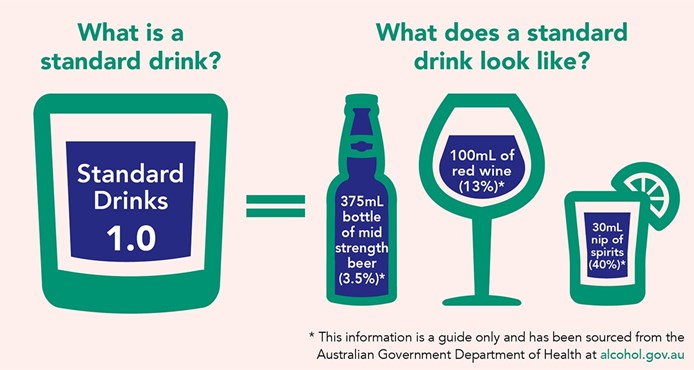What you need to know
- After a stroke, your doctor can tell you:
- If and when you can drink alcohol.
- How much alcohol you can drink.
- Drinking alcohol can increase your risk of having another stroke.
- Alcohol can increase the impact of changes to speech, thinking, vision and balance caused by your stroke. If fatigue is an issue for you, alcohol may make it worse.
- Alcohol can interfere with some medicines. It can be harmful if you are taking warfarin.
Alcohol and stroke risk
High blood pressure, atrial fibrillation (AF), being overweight and uncontrolled diabetes all increase your risk of having another stroke.
High blood pressure. Drinking too much alcohol can lead to high blood pressure.
Atrial fibrillation (AF) is a heart condition. When you have AF, your heart beats fast and out of rhythm.
Drinking alcohol increases your risk of developing AF. If you have AF, alcohol causes more frequent episodes of AF. If you have AF, talk with your doctor about alcohol.
Unhealthy weight. Reducing the amount of alcohol you drink will help you get to and maintain a healthy weight.
Uncontrolled diabetes. Drinking alcohol can make it harder to control blood sugar levels.
Stroke impacts
Drinking alcohol can increase the impact of changes to speech, thinking, vision and balance caused by your stroke. If fatigue is an issue for you, alcohol may make it worse.
A healthy lifestyle helps you make a good recovery from stroke:
- Be active.
- Eat healthy food.
- Be a healthy weight.
- Don't smoke.
- If you drink alcohol, only drink how much your doctor says is safe for you.
Stroke medicines
Alcohol can interfere with some medicines. It can be harmful if you are taking warfarin. Warfarin is a blood-thinning medicine.
Talk with your doctor
Your doctor can give you advice on alcohol and your stroke risk, medicines and impacts.
Your doctor can tell you:
- If and when you can drink alcohol.
- How much alcohol you can drink.
Advice for healthy people
The Australian Guidelines say:
To reduce the risk of harm from alcohol-related disease or injury, healthy men and women should have no more than 10 standard drinks a week and no more than 4 standard drinks on any one day. *
The less you drink, the lower your risk of harm from alcohol.
The Guidelines are for healthy people. Talk with your doctor about what is safe for you.
*This advice is current at time of printing June 2021. For the most up-to-date advice, visit nhmrc.gov.au/health-advice/alcohol
Standard drinks
Spirits: 30 ml of spirits with 40% alcohol by volume is 1 standard drink.
Beer: A 285 ml glass of full-strength beer is 1.1 standard drinks. A 285 ml glass of low-strength beer is 0.6 standard drinks. 285 ml is a small glass of beer.
Wine: 100 ml of wine or champagne is about 1 standard drink. The average glass in restaurants and pubs is 150 ml.
The label states how many standard drinks are in the bottle.

Drinking less
Start by keeping a diary of when and how much you drink. In social situations:
- Drink slowly and make every second drink a non-alcoholic drink. Choose sparkling water rather than a sugary drink.
- Drink low-alcohol drinks such as light beer.
Some people will encourage you to drink more alcohol. Say “I’m not drinking” or “I’ve had one already thanks”. You don’t need to explain or justify your decision not to drink alcohol.
For strategies and tips on drinking less, visit hellosundaymorning.org
More help
StrokeLine's health professionals provide information, advice, support and referral. StrokeLine's practical and confidential advice will help you manage your health better and live well.
Call 1800 STROKE (1800 787 653).
Email strokeline@strokefoundation.org.au
Join Australia's largest stroke community for information and support at enableme.org.au.
Talk with your doctor about how to cut down or stop drinking alcohol. Treatment and counselling services are available face to face, by telephone or online.
Counselling Online is a free and confidential service that provides support to people affected by alcohol or drug use.
Download Alcohol after stroke fact sheet (PDF)
For more information visit the EnableMe resource topics on Food and nutrition and Prevention.
